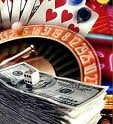Casino environments are beset by opportunities to experience losses from counterfeit fraud. Regardless of whether they are the focus of an organized crime ring, or of the casual independent fraudster, gaming establishments can be victimized at numerous points of transaction within their operations.
The ability to authenticate important documents at the time they are presented affords casino operators the chance to create a proactive barrier against many types of fraud.
Employee Fraud
At the heart of many casino fraud operations liesthe "inside man", a person hired under false pretenses (and, often, under false identification) to allow his compatriots access to key information, or to perform inside fraud, such as logging player reward cards for inaccurate times and dollar amounts, or preferential treatment at the gaming table.
Solution: Authenticate identification documents at time of hire. Authenticate Driver license, Social Security Card, Residency or Work Permit cards and MAINTAIN records for future reference.
Counterfeit Currency
Any point of transaction within a gaming establishment where currency is accepted is a point of vulnerability to counterfeit loss. Although counterfeit money represents a relatively small percentage of the total currency in circulation (0.01% in the United States, according to recent Treasury statistics), this still reflects a significant sum for operations which might handle tens of millions of dollars in cash in any given period.
represents a relatively small percentage of the total currency in circulation (0.01% in the United States, according to recent Treasury statistics), this still reflects a significant sum for operations which might handle tens of millions of dollars in cash in any given period.
Solution: Depending on nature of transactions, install electronic currency validators or ultra-violet lights at each point of transaction.
Stolen or Fake Credit Cards
One of the first places a buyer of stolen credit information will go to use a fraudulent card is to a high-transaction environment such as a casino, a bar or a nightclub. In 2009, counterfeit credit card losses amounted to more than $100 Billion, of which, the merchant accepting the card absorbed more than 90%.
Solution: Validate credit cards at time of transaction using simple ultra-violet light technology.
Credit Fraud /Credit Theft
Any issuer of credit is susceptible to fraud, whether through misrepresentation of facts, or by presentation of false identification documents utilizing stolen information. Under relatively recently enacted legislation, casinos must obey laws that apply to banks and other financial institutions as it relates to credit issuance. This includes implementing a "Customer Identification program" and a "Red Flag Rules" policy. However, the truth is that even without regulatory compliance drivers, casinos ought to be motivated to validate creditor identities by the dollar losses that result from issuing credit fraudulently.
Solution: Depending on the nature and volume of the credit transactions conducted, simple "validation" of identity might be sufficient. For example, validating identification documents under ultra-violet lights.
Higher volume and/or higher dollar-value transactions may require "authentication" of identity in order to be effective. True identity document authentication can only be conducted in one-way; that is, capture images of the ID document and compare the images to a comprehensive database where intricate design details and security features can be confirmed.
Forged Traveler Checks
Many casinos are located in major tourist destination cities or locales. Las Vegas, Atlantic City, Puerto Rico, cruise ships, etc. This means that the use of traveler checks as a form of negotiable instrument is statistically higher in casinos than in other businesses by a factor of many times.
Traveler checks contain very little in the way of "modern" security. They are printed on commonly available paper stock, and are typically secured using watermarks and hologram seals. Both of these traditional anti-counterfeiting techniques are long-outdated and can be overcome relatively easy by savvy counterfeiters.
Solution: Fortunately, traveler checks are also typically printed with UV security ink features, so they can be validated with the same equipment used to validate currency, credit cards and ID documents. When accepting traveler checks, casinos should validate BOTH the check and the ID of the person presenting it.


